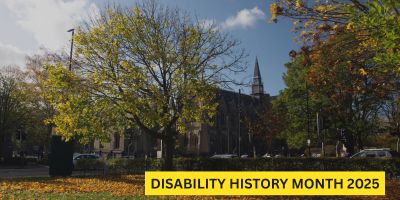Postgraduate researchers connect at Disability Studies symposium with Dr Sami Schalk

Centre for Disability Studies (CDS) members Johanna Knebel and Ruby Goodley, both Postgraduate Researchers (PGRs), reflect on a PGR Symposium held in the week of the 2024 Disability Studies Conference
One day prior to the Leeds Disability Studies Conference 2024, the postgraduate researchers (PGRs) of the Centre for Disability Studies (CDS) hosted a one-day symposium for PGRs and early career researchers. The day compromised of a workshop led by Dr Sami Schalk (University of Wisconsin-Madison, US) on ‘Critical Disability Studies as Methodology’ and a panel on ‘Black Disability Politics’.
‘Critical Disability Studies as Methodology’ workshop
The morning part of the symposium allowed Dr Sami Schalk to take PGRs through her work on ‘Critical Disability Studies as Methodology’ (Schalk, 2017). Her argument encouraged us to consider disability studies as not solely research with disabled people, but to broaden our conception of disability studies to include nondisabled people who are affected by forces of dis/ableism as her research about Black activist communities in the United States demonstrates (Schalk, 2022). Dr Sami Schalk gave an insightful and engaging introductory talk followed by questions from the audience. This provided a thought-provoking opening to the symposium.
‘Black Disability Politics’ panel

Panellists Dr Sami Schalk, Tasnim Hassan and Professor Scott Avery (centre of the photo) sit with symposium attendees.
In the afternoon of the symposium, a panel discussion centred the experiences of Black, Indigenous and Asian disabled people transnationally, building on Dr Sami Schalk’s 2002 book Black Disability Politics. Dr Sami Schalk brings an intersectional analysis to disability studies from the perspective of a crip, queer, black, and feminist disability studies scholar. In conversation were Dr Sami Schalk, Associate Professor of Gender and Women’s Studies at the University of Wisconsin-Madison, and Ms Tasnim Hassan, Co-director of Disabled Black Lives Matter UK. The panel was chaired by Professor Scott Avery, Professor of Indigenous Disability, Health and Wellbeing at the University of Technology Sydney. This panel discussion especially introduced Dr Sami Schalk’s work to some PGRs who said they had not considered intersectional analyses of disability and race before.
A welcoming space to connect
Overall, the PGR symposium was very well received amongst PGRs and ECRs who joined from a range of institutional and disciplinary backgrounds across universities from Chile, England, Iceland, Japan, Norway, and Scotland. People were appreciative that they got to meet and speak with internationally renowned senior scholars Dr Sami Schalk and Professor Scott Avery in such a welcoming, collegial, and supportive space. Additionally, this day allowed PGRs to make friends and connections before the conference started, which alleviated the trepidation of the larger conference space. It was repeatedly said that the symposium, “created a relaxed, collegiate and sharing space” (PGR Gill Porter, University of Leeds) for PGRs to engage in inter-personal debates and conversations with one another.
This symposium fostered ample opportunities for peer support, exchange, and networking amongst PGRs transnationally. Many existing PGR networks were able to present their networks and to invite others into their spaces. These networks are imperative for a sense of community amongst PGRs across the UK and globally.
CDS was pleased to offer this welcoming space to PGRs and thankful that so many attended and actively engaged in lively conversations and discussions.
Centre for Disability Studies
The Centre for Disability Studies has taken a pioneering role both nationally and internationally in disability studies. Members are united by their commitment to carrying out research and teaching that helps to achieve equality and social justice for disabled people, globally. To find out more, please visit their website.
Feature image (L-R): Johanna Knebel, Dr Sami Schalk, Leo Woodend




